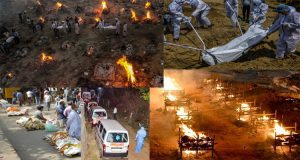 # COVID-19 deaths in India could possibly reach one million by 1 August 2021: Lancet
# COVID-19 deaths in India could possibly reach one million by 1 August 2021: Lancet
RNS: The second wave of coronavirus in India has turned more lethal. The country saw a massive surge in COVID-19 cases during this second wave, which set a new global record. Each day, the government reports more than 400,000 new COVID-19 infection cases, with around 3500 fatalities daily across the country.
The pandemic has left many infected people struggling to find treatment, with hospitals overcrowded and many running out of oxygen. Patients are dying while waiting for doctors.
Several countries have sent oxygen cylinders and other medical equipment to support the Indian crisis, but many hospitals throughout the country are confronted with a scarcity of life-saving equipment, beds, and oxygen.
India has been hit hard by a second COVID-19 wave, with cases and deaths hitting record highs every other day. With an acute shortage of oxygen and beds in many hospitals, and morgues and crematoriums overflowing, experts say the actual numbers for COVID-19 cases and fatalities could be far higher in the country, reported Aljazeera.
“India accounts for roughly half of all new cases worldwide. The actual numbers of deaths are significantly higher than the deaths being reported by the government,” reported several international media.
“Fatalities have been overlooked or downplayed, understating the human toll of the country’s outbreak, which accounts for nearly half of all new cases in a global surge,” New York Times reported.
According to experts, “the government figure varies from the realities, and the actual numbers of the virus’s spread is not shown.”
This is complete destruction of data, said Bhramar Mukherjee, epidemiologist of the University of Michigan. Mukherjee has been following India closely.
“Based on the number of models we have created, we believe that there are two to five times more deaths in India than the number reported,” he added.
“The COVID-19 deaths in India could possibly reach one million by 1 August 2021,” stated in an editorial of a renowned medical journal Lancet quoting the Institute of Health Metrics and Evaluation’s estimate. The Institute of Health Metrics and Evaluation is an independent Global Health Research Center of the University of Washington.
“If this will happen, the Modi government would be charged with the presidency of a self-inflicted national disaster,” it said.
The journal— Lancet also said that the government’s COVID-19 task force had not met in months until April – when the virus spiked.
Quoting Reuters, several media reported that a forum of scientific advisers set up by the government had warned Indian officials in early March of a new and more contagious variant of the coronavirus taking hold in the country. Four of the scientists told Reuters that the federal government did not seek to impose significant restrictions to stop the spread of the virus despite their warnings.
The government allowed Hindu religious festivals participated in by millions while Prime Minister Modi, leader of the ruling Bharatiya Janata Party (BJP) and opposition politicians held political rallies for regional elections. These events, experts said, turned out to be “super-spreaders”.
The editorial called on the Indian government to adopt a “two-pronged” strategy to fight against the epidemic by speeding up nationwide vaccination and reducing transmission of the deadly virus.
“The success of that effort will depend on the government owning up to its mistakes, providing responsible leadership and transparency, and implementing a public health response that has science at its heart,” it said.
The journal has explicitly mentioned the case in which many people criticized Prime Minister Modi on Twitter for dealing with the Coronavirus pandemic situation, which the government had removed from Twitter.
“At times, the Prime Minister Narendra Modi government has been seen to express more intentions to remove criticism on Twitter than to try to control the epidemic,” the journal wrote.
Meanwhile, the death tolls from a ferocious new Covid-19 wave are far higher than official records in the country. Even in the districts, the official numbers of Covid deaths significantly four-five times less than the deaths reported in the crematorium records during the particular periods.
Several cities across the country have reported shocking details of bodies wrapped in protective gear (identified as virus-related deaths), and lined up outside crematoriums for 3 to 4 days for their last rites.
Like the never-closing industrial plant, the dead bodies are found burning round the clock at burning ghats across the major infected states.
One of the reasons behind this is that most deaths occur at home and are unregistered, especially in rural parts of the country. Others often have anodyne—aging or cardiac attack—causing the listed cause of death leading experts to estimate that only between 20 per cent to 30 per cent of all deaths in India are correctly certified.
Another reason behind the uncounted deaths is that the government is not collecting data (deaths records) from the private hospitals, nursing homes, or hospitals run and managed by PSUs; reporting those deaths occurred in the government hospitals only.
Bloomberg reported: Not capturing death data accurately “creates the misconception that media is showcasing anecdotal cases and the overall situation is under control,” said Himanshu Sikka, the chief strategy officer, health at IPE Global, a development consulting firm. “This damages future preparations and measures needed for a possible third wave,” it stated in the report.
The Guardian in is article (Opinion Coronavirus- dated 06 May 2021) titled: “India is hiding its Covid crisis – and the whole world will suffer for it” mentioned that, “Epidemiologists in India and abroad estimate that the country’s official reported Covid-19 death toll – around 222,000 at time of publication – accounts for only a fraction of the real number. The director of the US-based Institute of Health Metrics and Evaluation has estimated that India is only detecting 3-4% of actual cases. Other experts point to total excess deaths in cities such as Mumbai as proof that there could be 60% to 70% more deaths from Covid-19 than the government is admitting to.
There are various reasons India could be cooking the books on Covid deaths. For one, the utter failure of the public health system makes it difficult to account for the millions of bodies passing through hospitals, clinics and those dying in their own home. Despite having become one of the largest economies in the world, Indian state and federal governments spend a dismal amount on healthcare, with an investment of less than 1% of its GDP, one of the lowest rates in the world, reported Guardian.
While undercounting disease is a longstanding problem in India, the assault on press freedom is far more recent. Since Modi came into power in 2015, the freedom of India’s expansive media culture has dramatically shrunk, according to sources including Reporters Without Borders.
In the last few years, the government has sued or prosecuted several news organizations and journalists, citing defamation or other even more dubious rationales. Controversial laws such as the 2000 Information Technology Act allow for what seem like increasingly frequent, and grossly arbitrary and politically motivated, crackdowns on freedom of speech and press, the report reveals.
The report also stated that “Indian journalists tell me they are often asked to self-censor their reporting on the Covid-19 pandemic, as well as what they say on social media, for fear of inciting the ire of the government. Many were understandably incensed last week when the Indian central government reportedly made Twitter and Facebook remove posts critical of the government’s Covid measures.”
Meanwhile, India continues to be one of the most dangerous places in the world for journalists to work, and more than 165 journalists have allegedly died of Covid-19 while covering the crisis itself. (Last month Kakoli Bhattacharya, an Indian journalist who worked as a news assistant for the Guardian, died of Covid.)
“In the absence of trustworthy Covid information from their own government, Indians are mostly reliant on social media and foreign reporting for the story of what’s actually happening,” reported The Guardian.


